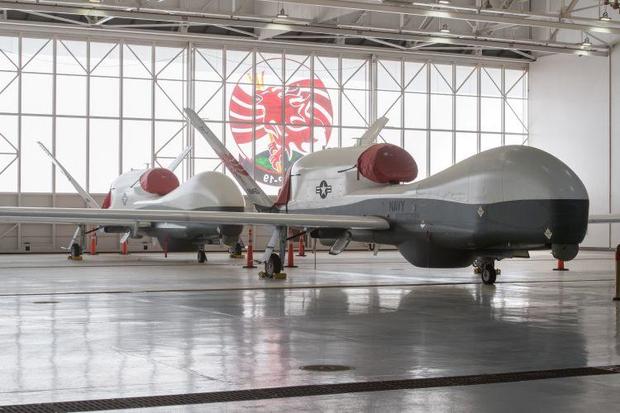- U.S. officials say Iran shot down an American spy drone over international waters over the Strait of Hormuz.
- Iran claims it shot down a U.S. drone flying in its airspace, and has condemned the alleged “provocative” act and warned of unspecified retaliation.
- The drone was shot down hours after Iranian-backed Houthi rebels in Yemen fired a missile into neighboring Saudi Arabia, a key U.S. ally in the Mideast.
- Both incidents come amid soaring tension in the region as the U.S. accuses Iran of multiple attacks on tankers.
Both the U.S. and Iran said Thursday that Iranian forces had shot down an American military surveillance drone, but the two sides offered conflicting details on the incident, which is likely to further escalate already soaring tensions in the Middle East. A U.S. official told the AP and Reuters news agencies that a U.S. Navy MQ-4C Triton drone was hit by an Iranian surface-to-air missile in international airspace over the Strait of Hormuz.
Iran, however, said its elite Revolutionary Guard shot down an RQ-4 Global Hawk drone as it flew over Iran. Iran’s Foreign Ministry issued a condemnation of the purported violation of its airspace and warned of a strong reaction to what it called a “provocative” act by the U.S.
The U.S. military has denied that any of its aircraft were operating over Iran at the time.
The incidents come amid warnings that an accident or miscommunication in the Persian Gulf could lead to a conflict between the U.S. and Iran, which have been increasingly at odds since President Donald Trump’s move last year to pull the U.S. unilaterally out of the 2015 nuclear agreement negotiated by his predecessor and other world powers.
The Trump administration has accused Iran of attacking six tankers near the Strait of Hormuz, a vital shipping channel through which about a third of the world’s oil supply sails every year, over the course of the last month. The drone incident came after the U.S. said Iran had fired a missile at another American drone last week, as it responded to the most recent attack on two oil tankers near the Gulf of Oman.
Iran has denied any involvement in the attacks on the tankers in the Gulf. The U.S. has offered mounting evidence allegedly showing Tehran’s involvement as it presses allies — and adversaries like Russia — to join in the condemnation of the Iranian regime over the attacks. Russia has accused the U.S. of trying to “provoke a war” with Iran, and urged caution in assigning blame for the tanker attacks.
The commander of Iran’s Revolutionary Guard force said Thursday that the shoot down of the drone was “a clear message” to the U.S., and that while the Islamic Republic does not want a conflict with America, it is “ready for war.”
In recent weeks, the U.S. has sped an aircraft carrier to the Mideast and deployed additional troops, adding to the tens of thousands already in the region. Iranian-allied Houthi rebels in Yemen have launched bomb-laden drones into neighboring Saudi Arabia, targeting pipelines and other infrastructure.
Missile strike
Hours before news of the drone shoot down broke on Thursday, the White House said it was aware of reports that a missile fired by the Houthis had struck what U.S. officials called “critical infrastructure” inside Saudi Arabia. A Houthi-run television station in Yemen said the missile had struck a power station in the southern Jizan province.
Saudi Arabian officials said the rocket fired by Yemeni rebels had struck a desalination plant, but no one was wounded and no damage was caused.
White House spokeswoman Sarah Sanders said President Trump had been “briefed on the reports of a missile strike in the Kingdom of Saudi Arabia,” adding: “We are closely monitoring the situation and continuing to consult with our partners and allies.”
A White House official confirmed to CBS News that senior officials met at the White House Wednesday night after the reports of the missile strike in Saudi Arabia.
Iran recently has quadrupled its production of low-enriched uranium and threatened to boost its enrichment closer to weapons-grade levels, trying to pressure Europe for new terms to the 2015 nuclear deal. The Trump administration has urged its European allies not to be cowed by Iran’s “nuclear blackmail.”
All this has raised fears that a miscalculation or further rise in tensions could push the U.S. and Iran into an open conflict, some 40 years after Tehran’s Islamic Revolution.


